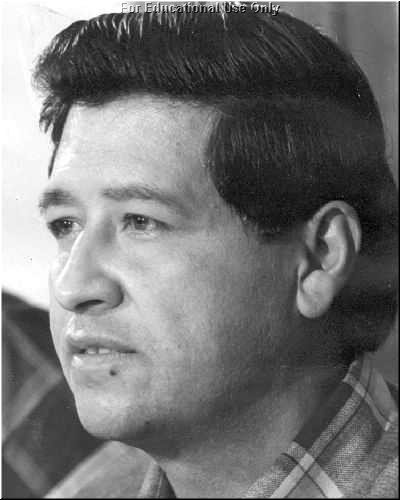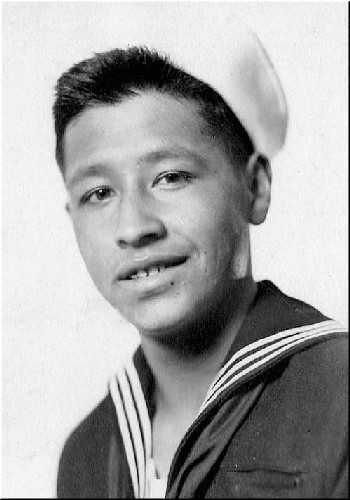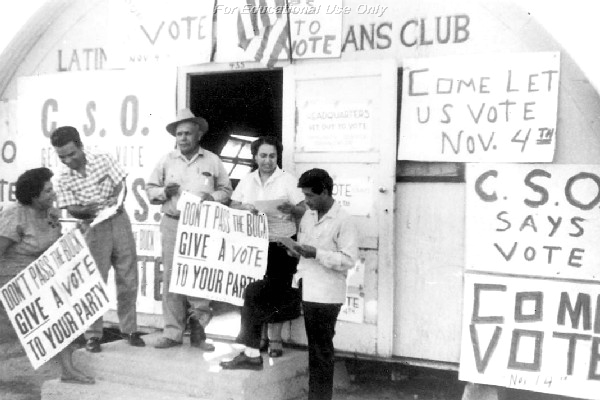
An American Hero
César E. Chávez was a good man who dedicated his life to helping others.
César was born to parents who taught him important ideas about hard work, the importance of education, and respect.
As a young boy, César worked on his family’s farm, feeding and watering the animals, collecting eggs, and bringing water to the house. César’s parents thought school was important. School was hard for César because the teachers only spoke English and César did not understand English. César thought some teachers were mean because they would punish him when he spoke Spanish. César learned to read English in school and he learned to read Spanish from his uncles.
César’s parents were very strict and taught him and his siblings to show respect to others.

His parents also taught him that it was important to help others. César and his family often helped his uncles, aunts, and cousins by giving them food when they had little to eat.
César’s grandmother, Mama Tella, taught him about the importance of their religious faith and to have a strong belief in God. When César grew up, he would remember and practice what his grandmother had taught him. For César, religion was a beautiful thing.
A very young César E. Chávez
When César was ten years old, his family’s home was taken away from them because they did not have enough money.
César’s family moved to California to find work. They began working on farms, picking fruits and vegetables. César’s family would move from farm to farm looking for work, just like many other families who also lost their homes.
1975: This farm worker family eats lunch beside the fields in the Santa Maria Valley in the shade of their van.
César’s family moved often. Moving did not bother César or his siblings too much because they were always happy to be together as a family.
Farm workers like the Chávez family would work long hours. They often had few bathrooms and little clean water to drink. Farm workers suffered a lot and they were not treated with respect or dignity.
1971: Farm workers pick chili at Santa Maria.
César’s family worked hard on the farms, but they made little money. Everyone in the family had to work, even the children. To make things worse, sometimes the men in charge of the farm workers would cheat and steal money from the farm workers, including César’s family. These men would often run away so they would not get caught.
Many times, César’s family did not have enough food to eat. César and his family never thought of themselves as being poor. César’s mother would often tell César and his brother Richard to find homeless and hungry men so she could cook them a meal.

When César was a teenager, he and his older sister Rita would help other farm workers and neighbors by driving them to the hospital to see a doctor. Without César’s and his sister’s help, these people would have had a very difficult time getting a doctor’s help.
The people César helped often wanted to give him a little bit of money to pay for gas and for his help. César never took any of their money because his mother would have been mad at him. She used to say, “You always have to help the needy, and God will help you.”
A few years later, César volunteered to serve in the United States Navy. César served in the military to fight for freedom and to protect the people of the United States.
After two years in the Navy, César returned home and married his girlfriend, Helen. After a short time, they moved to San Jose, California and started a family.
Life changed for César when he met a man named Fred Ross. Fred Ross believed that if people worked together they could make their community better. Fred Ross hired César to work for him in the Community Service Organization.
The Community Service Organization worked to help people. César now worked to bring people together to identify problems and find ways to solve their problems. Many problems were not solved because community leaders did not respect all people.
César, Fred Ross, and the Community Service Organization helped people in the community learn how to vote. They also taught people that community leaders respected voters. Community leaders worked harder to solve the problems of voters. César worked in many communities in California to help people gain the respect they deserved.

After helping many people gain the respect of community leaders, César left the Community Service Organization to help farm workers gain the respect and dignity they deserved. César started the National Farm Worker Association to help improve the working conditions of farm workers. African Americans, Filipinos, white Americans, Mexican Americans and Mexicans, and people of all backgrounds joined César.
César and the farm workers wanted the companies and growers that owned the farms to respect farm workers by providing them with fresh water to drink, bathrooms in the fields, and fair pay for a day’s work. The companies and growers refused to treat the farm workers with respect and dignity. The growers did everything they could to stop César and the farm workers. They even turned to violence and hurt many farm workers and people who helped the farm workers. This made César extremely upset.
César did not believe in violence. Like Martin Luther King, César wanted to bring change in a nonviolent way. Many people came to help César and support him. Like César, they also believed that farm workers deserved better treatment, respect, dignity, justice, and fairness. César worked hard. He suffered and sacrificed a lot to make farm workers’ lives better.
After five years, some growers in California agreed with César and started to provide farm workers with fresh water to drink, bathrooms, and better pay. César, the farm workers, and their friends won, making farm worker’s lives better. César dedicated the rest of his life to making the world a better place and to serving others. He continued to work to bring respect, dignity, justice, and fair treatment to the poor, to farm workers, and to people everywhere.
César died on April 23, 1993. He was sixty-six years old. People all over the world remember César E. Chávez as a man of courage who fought to improve the lives of all people.
César E. Chávez is an American hero.
His legacy lives on!
Article Courtesy.
All photos copyright to: Cesar E Chavez Foundation and Manuel Echavaria,
 An American HeroCésar E. Chávez was a good man who dedicated his life to helping others.César was born to parents who taught him important ideas about hard work, the importance of education, and respect.
An American HeroCésar E. Chávez was a good man who dedicated his life to helping others.César was born to parents who taught him important ideas about hard work, the importance of education, and respect. His parents also taught him that it was important to help others. César and his family often helped his uncles, aunts, and cousins by giving them food when they had little to eat.César’s grandmother, Mama Tella, taught him about the importance of their religious faith and to have a strong belief in God. When César grew up, he would remember and practice what his grandmother had taught him. For César, religion was a beautiful thing.A very young César E. Chávez
His parents also taught him that it was important to help others. César and his family often helped his uncles, aunts, and cousins by giving them food when they had little to eat.César’s grandmother, Mama Tella, taught him about the importance of their religious faith and to have a strong belief in God. When César grew up, he would remember and practice what his grandmother had taught him. For César, religion was a beautiful thing.A very young César E. Chávez When César was ten years old, his family’s home was taken away from them because they did not have enough money.César’s family moved to California to find work. They began working on farms, picking fruits and vegetables. César’s family would move from farm to farm looking for work, just like many other families who also lost their homes.1975: This farm worker family eats lunch beside the fields in the Santa Maria Valley in the shade of their van.César’s family moved often. Moving did not bother César or his siblings too much because they were always happy to be together as a family.Farm workers like the Chávez family would work long hours. They often had few bathrooms and little clean water to drink. Farm workers suffered a lot and they were not treated with respect or dignity.
When César was ten years old, his family’s home was taken away from them because they did not have enough money.César’s family moved to California to find work. They began working on farms, picking fruits and vegetables. César’s family would move from farm to farm looking for work, just like many other families who also lost their homes.1975: This farm worker family eats lunch beside the fields in the Santa Maria Valley in the shade of their van.César’s family moved often. Moving did not bother César or his siblings too much because they were always happy to be together as a family.Farm workers like the Chávez family would work long hours. They often had few bathrooms and little clean water to drink. Farm workers suffered a lot and they were not treated with respect or dignity. 1971: Farm workers pick chili at Santa Maria.César’s family worked hard on the farms, but they made little money. Everyone in the family had to work, even the children. To make things worse, sometimes the men in charge of the farm workers would cheat and steal money from the farm workers, including César’s family. These men would often run away so they would not get caught.Many times, César’s family did not have enough food to eat. César and his family never thought of themselves as being poor. César’s mother would often tell César and his brother Richard to find homeless and hungry men so she could cook them a meal.
1971: Farm workers pick chili at Santa Maria.César’s family worked hard on the farms, but they made little money. Everyone in the family had to work, even the children. To make things worse, sometimes the men in charge of the farm workers would cheat and steal money from the farm workers, including César’s family. These men would often run away so they would not get caught.Many times, César’s family did not have enough food to eat. César and his family never thought of themselves as being poor. César’s mother would often tell César and his brother Richard to find homeless and hungry men so she could cook them a meal. When César was a teenager, he and his older sister Rita would help other farm workers and neighbors by driving them to the hospital to see a doctor. Without César’s and his sister’s help, these people would have had a very difficult time getting a doctor’s help.The people César helped often wanted to give him a little bit of money to pay for gas and for his help. César never took any of their money because his mother would have been mad at him. She used to say, “You always have to help the needy, and God will help you.”A few years later, César volunteered to serve in the United States Navy. César served in the military to fight for freedom and to protect the people of the United States.After two years in the Navy, César returned home and married his girlfriend, Helen. After a short time, they moved to San Jose, California and started a family.Life changed for César when he met a man named Fred Ross. Fred Ross believed that if people worked together they could make their community better. Fred Ross hired César to work for him in the Community Service Organization.The Community Service Organization worked to help people. César now worked to bring people together to identify problems and find ways to solve their problems. Many problems were not solved because community leaders did not respect all people.César, Fred Ross, and the Community Service Organization helped people in the community learn how to vote. They also taught people that community leaders respected voters. Community leaders worked harder to solve the problems of voters. César worked in many communities in California to help people gain the respect they deserved.
When César was a teenager, he and his older sister Rita would help other farm workers and neighbors by driving them to the hospital to see a doctor. Without César’s and his sister’s help, these people would have had a very difficult time getting a doctor’s help.The people César helped often wanted to give him a little bit of money to pay for gas and for his help. César never took any of their money because his mother would have been mad at him. She used to say, “You always have to help the needy, and God will help you.”A few years later, César volunteered to serve in the United States Navy. César served in the military to fight for freedom and to protect the people of the United States.After two years in the Navy, César returned home and married his girlfriend, Helen. After a short time, they moved to San Jose, California and started a family.Life changed for César when he met a man named Fred Ross. Fred Ross believed that if people worked together they could make their community better. Fred Ross hired César to work for him in the Community Service Organization.The Community Service Organization worked to help people. César now worked to bring people together to identify problems and find ways to solve their problems. Many problems were not solved because community leaders did not respect all people.César, Fred Ross, and the Community Service Organization helped people in the community learn how to vote. They also taught people that community leaders respected voters. Community leaders worked harder to solve the problems of voters. César worked in many communities in California to help people gain the respect they deserved. After helping many people gain the respect of community leaders, César left the Community Service Organization to help farm workers gain the respect and dignity they deserved. César started the National Farm Worker Association to help improve the working conditions of farm workers. African Americans, Filipinos, white Americans, Mexican Americans and Mexicans, and people of all backgrounds joined César.
After helping many people gain the respect of community leaders, César left the Community Service Organization to help farm workers gain the respect and dignity they deserved. César started the National Farm Worker Association to help improve the working conditions of farm workers. African Americans, Filipinos, white Americans, Mexican Americans and Mexicans, and people of all backgrounds joined César. César and the farm workers wanted the companies and growers that owned the farms to respect farm workers by providing them with fresh water to drink, bathrooms in the fields, and fair pay for a day’s work. The companies and growers refused to treat the farm workers with respect and dignity. The growers did everything they could to stop César and the farm workers. They even turned to violence and hurt many farm workers and people who helped the farm workers. This made César extremely upset.César did not believe in violence. Like Martin Luther King, César wanted to bring change in a nonviolent way. Many people came to help César and support him. Like César, they also believed that farm workers deserved better treatment, respect, dignity, justice, and fairness. César worked hard. He suffered and sacrificed a lot to make farm workers’ lives better.After five years, some growers in California agreed with César and started to provide farm workers with fresh water to drink, bathrooms, and better pay. César, the farm workers, and their friends won, making farm worker’s lives better. César dedicated the rest of his life to making the world a better place and to serving others. He continued to work to bring respect, dignity, justice, and fair treatment to the poor, to farm workers, and to people everywhere.César died on April 23, 1993. He was sixty-six years old. People all over the world remember César E. Chávez as a man of courage who fought to improve the lives of all people.César E. Chávez is an American hero.His legacy lives on!
César and the farm workers wanted the companies and growers that owned the farms to respect farm workers by providing them with fresh water to drink, bathrooms in the fields, and fair pay for a day’s work. The companies and growers refused to treat the farm workers with respect and dignity. The growers did everything they could to stop César and the farm workers. They even turned to violence and hurt many farm workers and people who helped the farm workers. This made César extremely upset.César did not believe in violence. Like Martin Luther King, César wanted to bring change in a nonviolent way. Many people came to help César and support him. Like César, they also believed that farm workers deserved better treatment, respect, dignity, justice, and fairness. César worked hard. He suffered and sacrificed a lot to make farm workers’ lives better.After five years, some growers in California agreed with César and started to provide farm workers with fresh water to drink, bathrooms, and better pay. César, the farm workers, and their friends won, making farm worker’s lives better. César dedicated the rest of his life to making the world a better place and to serving others. He continued to work to bring respect, dignity, justice, and fair treatment to the poor, to farm workers, and to people everywhere.César died on April 23, 1993. He was sixty-six years old. People all over the world remember César E. Chávez as a man of courage who fought to improve the lives of all people.César E. Chávez is an American hero.His legacy lives on!






